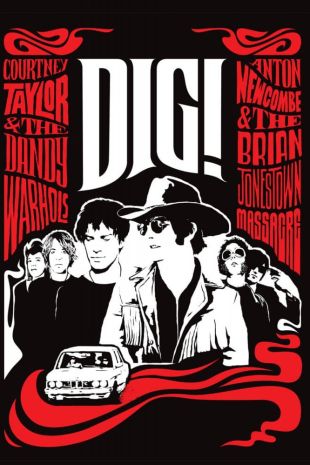
The bearing of temperament, as opposed to talent, on potential success in the music business is entertainingly explored in DIG!, Ondi Timoner's exhaustive document of the diverse fortunes of two bands, the Dandy Warhols and the Brian Jonestown Massacre. Culled from a mind-boggling amount of footage, which Timoner gathered over seven years while following the bands almost from their formations, DIG! isn't as concerned with differences in the groups' musical styles (few songs are heard for more than a few bars at a time) as it is with personalities and interpersonal conflict. In this regard, it echoes the purportedly superficial concerns of the fickle industry it depicts, and it's not entirely clear whether this is Timoner's intent. Still, what she does choose to show contains undeniably engaging drama. There is a brief period during which the band leaders, Courtney Taylor of the Dandy Warhols and Anton Newcombe of the Brian Jonestown Massacre, are on good, mutually admiring terms, and each appear to have a bright future. While the Warhols quickly get signed to a major label, the dementedly demanding Newcombe implodes at an industry showcase over the perceived musical inadequacies of his bandmates. This leads to a startling total meltdown on-stage, as band members quit in mid-set, and the hostilities get physical. Timoner captures more than a few such moments in this engrossing saga, and through such painful (though frequently darkly funny) detail, the film is successful in documenting how Newcombe's personal obsessions and failings derail his surefire musical career. But in presenting the self-proclaimed "most well-adjusted band in America," as a counterexample, complete with Taylor's self-promotional narration, Timoner makes Newcombe seem more responsible for his own failure in the industry than he may actually be. In the end, the music should matter more than it apparently does.
